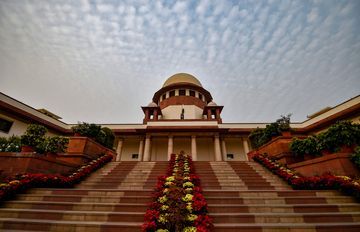Rarely has the Supreme Court been brought into such ridicule as in the judgment over the petitions seeking a court-monitored probe into the Rafale deal.
Indeed, the court was not wrong in dismissing the petitions. Deciding which war-jets to buy, and how to buy them, are political decisions, not judicial. On these things, the guys in the cabinet are better judges. They get the best advice from the brass hats and the babus.
But the court got into problem where the judges cited the reasons for throwing out the petitions. They said the comptroller and auditor-general had probed the matter, and that a redacted version of his report had been given to Parliament, and that the public accounts committee was seized of it.
Sorry, m’lords! Nothing of the kind had happened.
The CAG is indeed seized of the matter. But he is yet to submit his report—always a full one, never a redacted one—to Parliament. Only then would the PAC, which is a body of Parliament, be seized of it.
The opposition says that the judges have been misled by the government—that the sealed cover that the government submitted to the judges had contained this silly stuff. They have issued a breach of privilege notice on the prime minister.
That does not give much credit to the court. For, the question then is: should not the judges have known better? Don’t they know how other constitutional entities such as the CAG and Parliament, and parliamentary entities like the PAC, work?
The government’s defence puts the court in a poorer light. They say, they had explained the procedure in the present tense, but the judges took them as past tense. Would they next seek to submit copies of Wren & Martin?
Courts are not used to secrets. Court proceedings are open, and the principle in common law is that all parties in a litigation must disclose all evidence to the other party.
But, at times litigants can seek not to disclose certain things in public interest. Governments seek this privilege in sensitive matters. They seek to submit the evidence in a sealed cover with a James Bond-style ‘for your eyes only’ stamp (not literally), if they are convinced that disclosure of the evidence could damage public interest. The Americans call it executive privilege; the British used to call it Crown privilege. Lord Reid called it public interest immunity, and now both the British and we call it so. In our law, Section 123 of the Evidence Act provides for it.
In the olden days this privilege had only to be asked, and it was granted. In the Duncan v. Cammell, Laird & Cocase about the loss of a submarine, the plaintiff asked for certain documents, and the Crown claimed privilege. The House of Lords held that the court must accept the plea, hook, line and sinker. But in Conway v. Rimmer, the Lords decided that the court could also reject a privilege claim by the Crown. They held that it was the duty of the court to examine the documents thoroughly and decide whether the privilege claim was justified.
Our courts too have been expanding the liberal scope of the law. In Punjab v. S.S. Singh, the court laid down the rules for seeking and granting privilege. In Amar Chand Butail v. Union of India, the court rejected the privilege plea saying that the minister who certified the need for privilege had not applied his mind. The famous S.P. Gupta case (first judges case) leaned further in favour of openness.
The principle is: trust, but verify. If only the court had asked the government for the CAG report, it would not have found itself in this spot.
The papers were not for your eyes only; they were for your minds too.
prasannan@theweek.in


